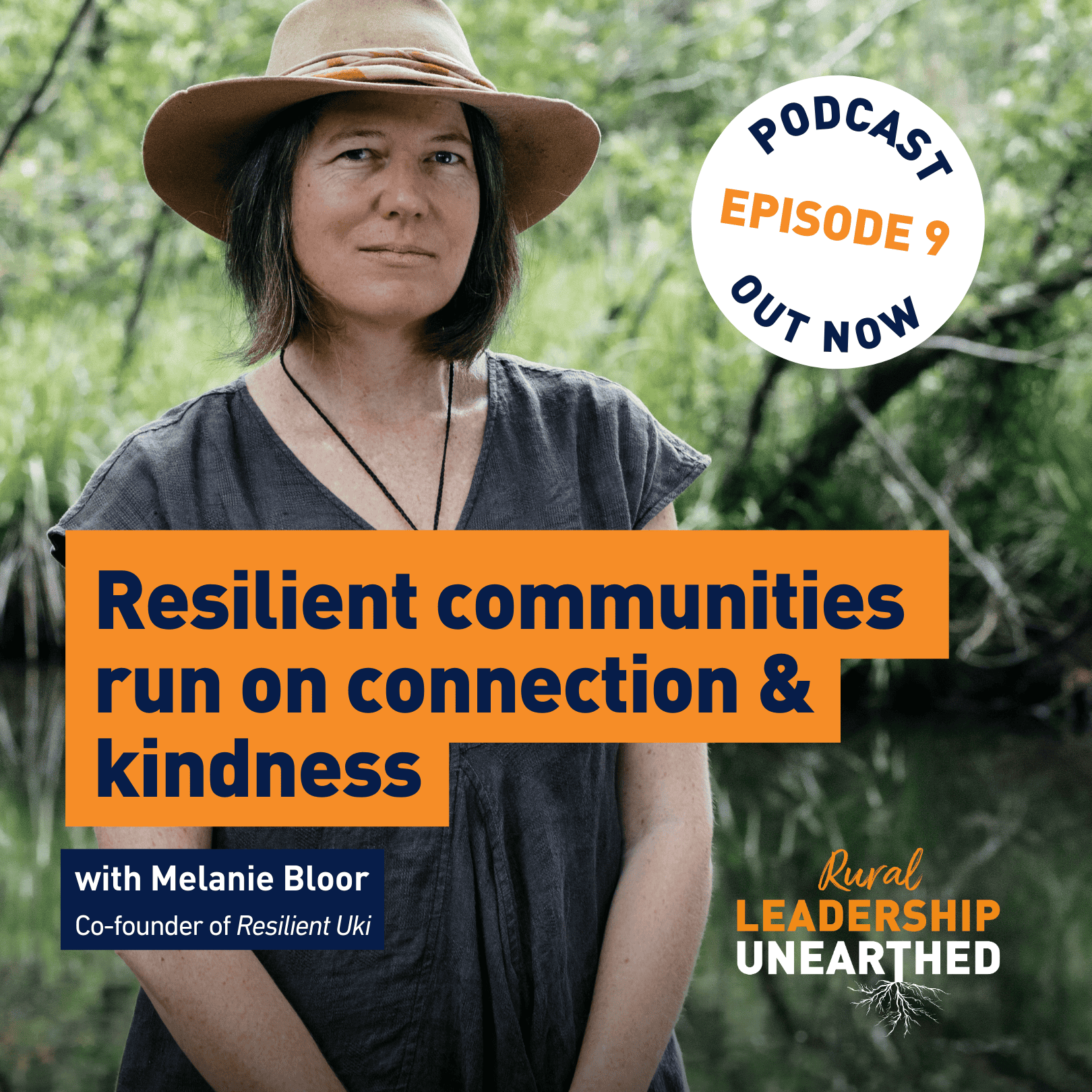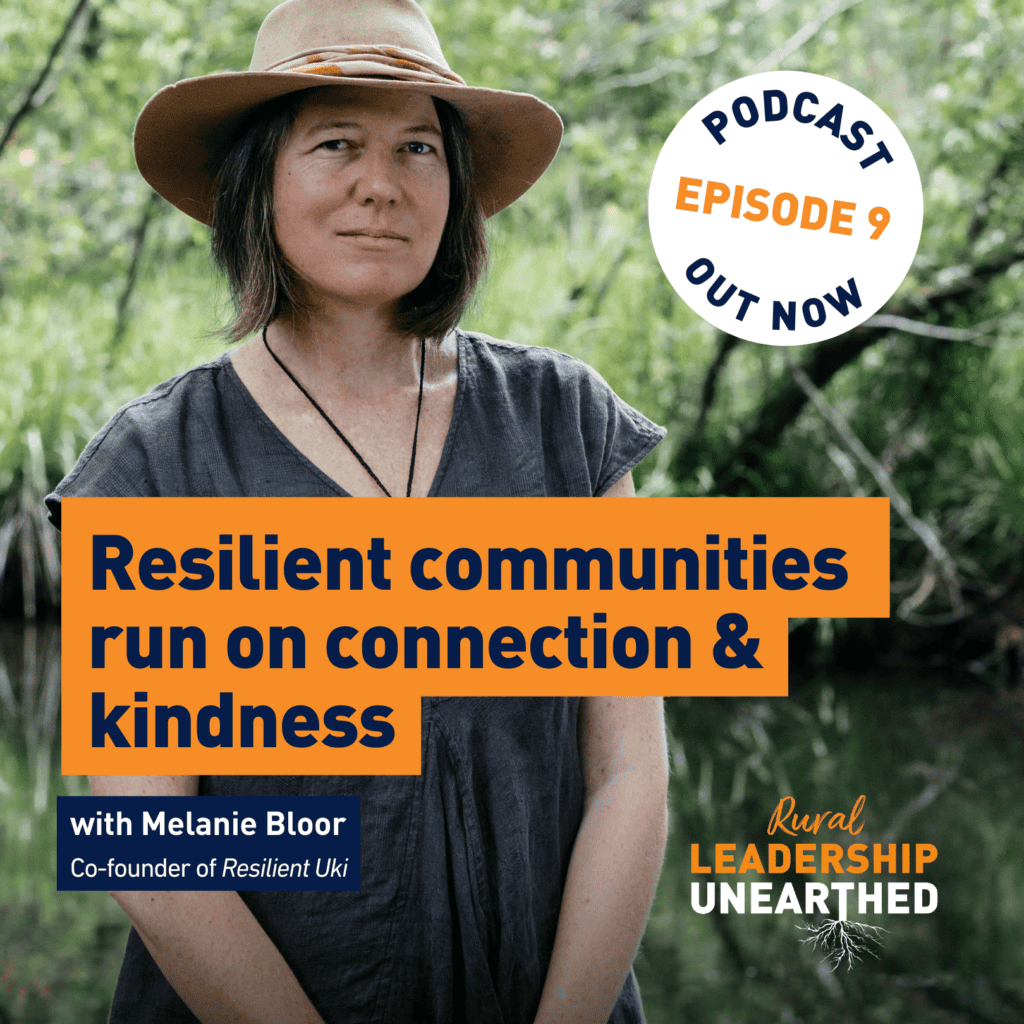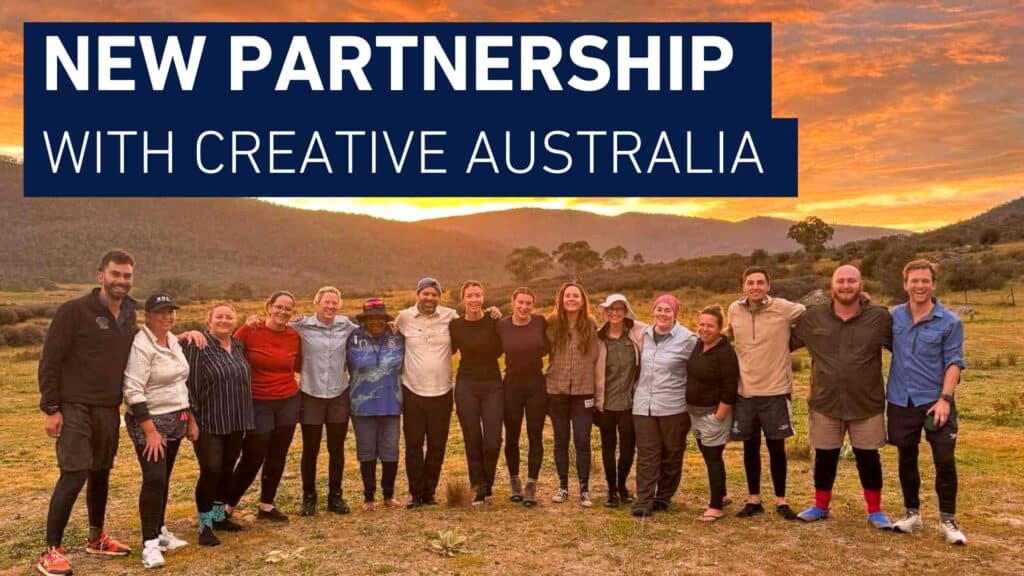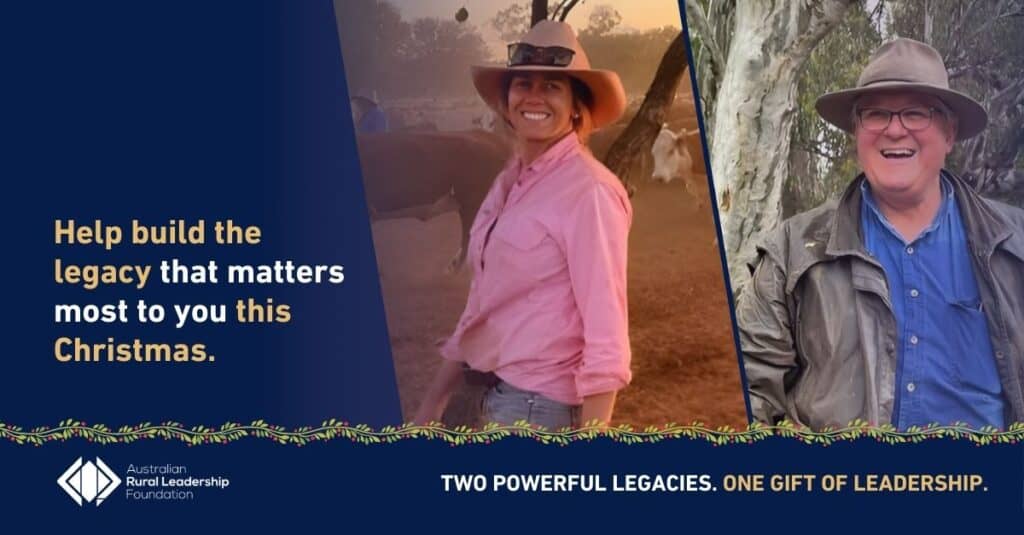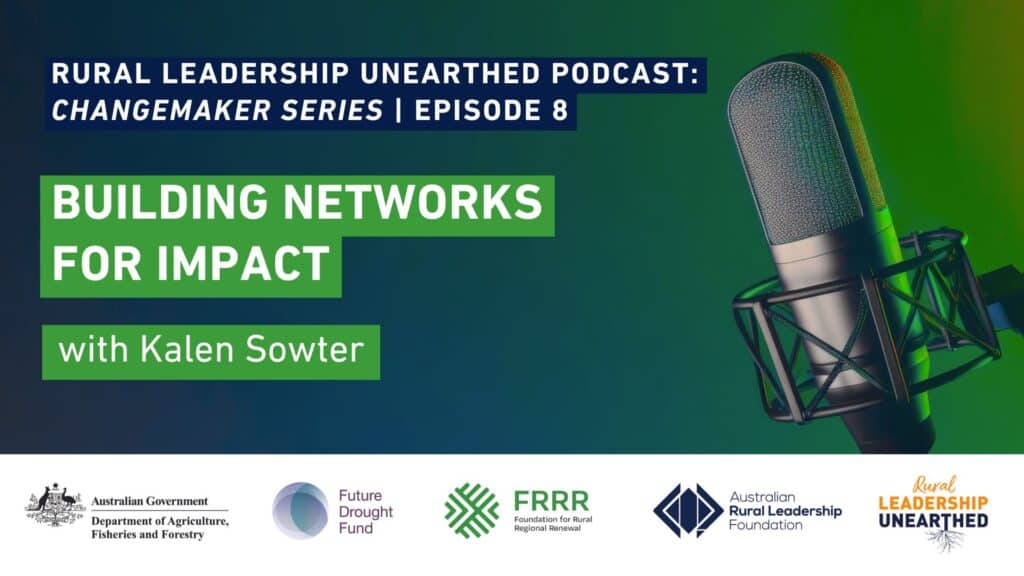Rural communities have very little control over when natural disasters will strike. They have an enormous amount of power to foster the connection and self-reliance that will see them better able to care for each other and engage with relief and recovery efforts. Melanie Bloor is a ‘connections cultivator’ and co-founder of the inspiring grass-roots community group, Resilient Uki. In the latest episode of ARLF podcast, Rural Leadership Unearthed, Mel shares her experience of the 2022 flooding in northern NSW, and the work she and her community have done to prepare for future challenges. Sitting down with Claire Delahunty, Mel unpacks the true meaning of resilience, and the key ingredients to hyper-local leadership.
Melanie Bloor has a background in environmental science and climate advocacy, and is a graduate of the Australian Rural Leadership Foundation’s Leading Australian Resilient Communities (LARC) Program. She has an article published in the Australian Journal of Emergency Management and is busy generating and collating community resilience-building tools to share nationally.
Claire Delahunty: Do you mind just introducing yourself, describing where you live and what you do?
Melanie Bloor: I currently live in a little village called Uki. We call ourselves an artist’s village. I call it the hills behind Byron, but it’s not quite, but that helps locate us. My main job is mum of two beautiful boys, and the rest of the time I volunteer to build the resilience of mine and other communities in the face of climate change.
CD: What sort of community did you grow up in?
Melanie Bloor: I grew up on the sea cliffs of Mackay in Yirrugu country. I should say that I’m currently live on the lands of the Bundjalung Nation as well at the foot of Wulumban, the sacred mountain that created this whole area. So I’ve got a Uki/Mackay connection going on. And so rural Queensland, coastal town, sugar, coal. An eclectic mix. I loved it there very much. I grew up on this cliff overlooking the ocean. We had cyclones. I got used to disasters from birth, because every year we faced complete annihilation as a possibility. And it wasn’t really a problem for us. We just did the thing that you need to do.
CD: Please tell us all about Resilient Uki.
Melanie Bloor: So first of all, I just need to very clearly say that Resilient Uki rides on the back of over a decade’s worth of work from a group called the Uki Flood Group. And they are the real amazing pioneers. Our town, Uki, is on the bank of the Tweed River and it comes, well, it came up nearly 14 metres in the ‘22 flood. It rises very high and it’s very swift flowing, so we’re quite vulnerable. They started up a thing called the Neighbourhood Project, where they did this just for the village. Resilient Uki has expanded that vision to be across all hazards and to encompass the whole of the headwaters of the Tweed River rather than just the village of Uki.
We’ve divided our area into about 300 people in each neighbourhood – that seems to be the magic number. And then there’s a couple of shepherds or leaders in those areas.And then within that neighborhood, we’ve broken it down even further into what we call pods, which are clusters of houses. Often the boundaries of those pods will be geographic boundaries, where they’re isolated from their other cluster of houses. And then there’s one or two pod leaders in each of those areas – the idea being that, just like shepherding, we are trying to build the capacity of those people who have stood up to look after or care for those areas with the skills to be able to do that in an effective way. I
n the floods we had so many landslips, hundreds of landslips, some of them like whole halves of mountains, and some quite small but they created a lot of isolation. And of course, the communications were down, so people couldn’t get together to problem solve and they couldn’t see if their loved ones were okay. And I would suggest that for us, a lot of the trauma came from this lack of being able to connect with the other humans that we live around. Even if you don’t like your neighbour, we woke up in the morning and our first thoughts were, ‘I wonder if my neighbour is dead?’ We’ve now got a UHF network. In each of those pods, there’s a radio, so everyone in that area should theoretically be able to walk to that radio and get information out or receive information in if needed.
Then we have embedded in each of those neighborhoods some psychological first aid and some physical first aid and we’ve done some mapping not just of the terrain but also of the skills and the resources that are available in that area. Where are the doctors? Where are the people with the tractors? Who are they? All those kind of things. So we’re just really getting to be more connected with each other. Building our social capital is the phrase that’s used. I like connection and kindness. We’re fostering connection and kindness in those areas.
CD: For that greater context around the flood itself, how long was your community acutely impacted in that way?
Melanie Bloor: Some people really can’t get back to their houses still. My access still won’t take a truck two and a half years later. We had a second flood one month after the first flood.So I would say that we were in that acute stage for six weeks, because a lot of the remediation work that we did after that first flood was washed away in the second flood.
CD: There are an increasing number of natural disasters where communities are having a bit of shock that the mechanisms that we expect to be there for us maybe aren’t there as quickly as communities need. What was the experience like for you and fellow community members realising what was and wasn’t going to come to assist you?
Melanie Bloor: Yeah, that was definitely a large penny dropping that moment. I had already been working voluntarily, building community resilience for a few years before the flood, so you think I would have been all over it, but I wasn’t.And honestly, the benevolent machine weren’t all over it as well. They were in the same boat as us. They had no communications and no power. Their access was limited everywhere. All their volunteers couldn’t do their job because they couldn’t get out of their houses. They were reeling with all the same impacts as us and on a broad scale. It was just absolute widespread chaos. We didn’t get the help that we thought we would have got. But that was okay because we were able to look after ourselves really, really well.
I think it’s really important for everyone out there to realise that the government very clearly says that you need to last for three days without any assistance, and they mean it. And I would suggest that you should have a lot more than three days. Everyone ran out of pet food, for example. At the start, we were on our own, and people need to plan to be on their own.
CD: It sounds like that realisation on top of trauma would be really difficult, would be an extremely stark thing to digest.
Melanie Bloor: Yes, that’s why I came up with the term ‘benevolent machine’ in that moment, to help my community to deal with that trauma because – and that’s where I think leadership is really important to be able to deftly bring in the ‘reframe’ in pivotal moments. That’s one of the things that we’re helping our neighborhood leaders to understand and be able to navigate skilfully.
CD: What did it look like to start to organize who would take on what tasks and how to get a bit of a collective vision about what you wanted to achieve?
Melanie Bloor: So again, like I said, we were really lucky because we already had the building blocks of this system in place.
In terms of buy-in, after an event, there’s a beautiful graph that you could look up and it looks at the emotional landscape after a crisis and there’s usually what they call the ‘heroic’ and then the ‘honeymoon period’ where there’s this massive spike where everyone just feels fabulous. It’s really weird, like this terrible thing’s happened, there’s just carnage everywhere and everyone feels amazing because you don’t have to go and see the in-laws tomorrow, you don’t have to go to work, washing, who gives a shit about the washing? All there is to do is the job at hand and to care for each other. And people love to care for each other, we just don’t find the time in our overwhelmed lives.
The trick for us was to try and capture that energy while it was there. So we moved very quickly from relief and into this preparation stage. Everyone wanted to put their hand up at that point, and it’s just good that we happened to have the nous to be able to have something available for them to put their hand up for.
CD: What was the natural fit for you, Mel, what did that look like for your leadership?
Melanie Bloor: Again, was just me just being the mama bear. I helped run our community hub, which was the hall where people came to receive and give assistance. Everyone was able to come forward with a great idea and be supported to do it and didn’t look to someone to tell them what to do, because I think this is the trouble that we’ve got ourselves into in this modern context. People are so used to being told what to do. And that is to me, that’s the opposite of leadership.
I was just there to support everyone else to follow through with what they thought was important or what they could do. That, I guess, is the skill set that I bring to the picture. I really think that everyone can lead and everyone should lead, even if it’s just a person leading their household to cut the trees around off their house or something like that.
CD: What are you learning in terms of the impact Resilient Uki is having for your community and beyond?
Melanie Bloor: We have still got a long list of things that we want to do. We are segueing a little bit more into community development, rather than rampant preparation. We are moving into fostering this sense connection and kindness and neighbours knowing neighbours because really in the end, that’s your best bet. If you know the people that live around you, you’re in a much better position to be able to face crises.
What we’re doing here in Uki, people are doing all over Australia. We’re nothing ridiculously special. I just like to rant on about it more than other people probably. The Red Cross are actually getting right behind it and rolling out a thing called Community Resilience Teams, which is this same model.
CD: And can we talk about the ‘R word’? What’s your relationship with resilience?
Melanie Bloor: I really like the word and I can’t think of a better one that describes this kind of lofty notion that we can work towards. To me, it seems like a bit like happiness, you know? Or love. I would love to be happy all the time in a beautiful place of unconditional love. But I’m not always like that? I would really like to be resilient all the time, but I’m not always like that. But it doesn’t mean that I don’t use those words and I don’t try and put the things in place in my life to be able to move towards being in that state. I think that part of the confusion comes into the word being used for human and non-human things.
When you’re talking about a bridge, if you’ve got a resilient bridge just needs to be one thing. It handled the flood or it didn’t handle the flood, and got washed away. Whereas for humans it’s not really like that. Resilience feels a bit more like a fluid landscape; an emotional inner landscape that some days you’re feeling more resilience and the other days you’re not. I think it’s something to be embodied, I guess, rather than attained. And I really don’t like the idea of measuring it. How do you measure happiness?
CD: The idea of that ‘connection and kindness’ focus – if you’re doing that in your community, then you will be better placed in the face of adversity. That’s quite powerful.
Melanie Bloor: I just think it’s the number one thing. I mean, the combat agencies are all about the processes and the resources, right? They’ve got plans for everything and they’ve got gear for everything. And in that flood, you know, that whole system just crumbled. What was left was that human that was standing next to that human and was able to help them. And that is the common denominator. It’s been shown pretty much in every large natural or unnatural disaster around the world for millennia; it’s people caring for and helping other people and problem-solving collectively. Just making do with what you’ve got.
But having said that, having plans and having resources is a very close cousin of connection and kindness when you’re looking at disaster resilience.
CD: What impact has the LARC program had on you?
Melanie Bloor: Oh blessed be ARLF. I saw this opportunity and I applied and was accepted, which I thought was amazing because I just was some ‘rando’ from a little tiny village. I wasn’t really a great leader in the traditional sense of the word.
This is where I was able to place the activities that just seemed natural for us within a broader context and into a bigger ‘systems change’ space, and to also have some good practical tools around self-care and these kinds of things. (Not that I paid any attention to that, because you don’t in that time.)
We also got into smaller groups and we came up with a project. That’s what ARLF has given me more than anything else is connection with other people. We have developed a tool for community organisations like the CWA to be able to look at how they can foster a fertile ground in their organisation to be able to assist in times of crisis or to enable resilience in others in their community. We’re just in the final stages of packaging that up as a shareable tool that we can distribute.
My vision is a national knowledge-sharing hub for communities who haven’t been interested in preparing for crises, and a crisis then hits and all of a sudden the search is on. ‘Okay, so I need to know how to do this thing that I’ve never even considered before. How do I do that thing?’ I want to create an easy access point for them to be able to locate tools or templates or case studies so that they can easily move forward in either their preparation activities or their relief or recovery activities and make the most of the energy and interest while it’s there.
CD: You’re also an in-demand speaker on this topic. Do you feel like you’ve become the voice or the face for community-led strategy and planning around disaster preparedness?
Melanie Bloor: I think I’m just the squeaky wheel.I think I’m just unable to contain my passion for this. There’s a lot of work to be done upstairs, so to speak. And so downstairs, on the ground, we need to fast track this and we need to do it ourselves and we need to do it without funding and without support and we need to do it collectively.


